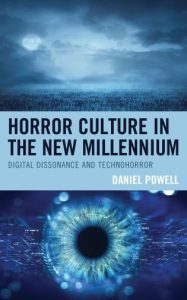
T&T alumni Daniel W. Powell published his new book Horror Culture in the New Millennium: Digital Dissonance and Technohorror, exploring the myriad of ways in which technology is altering the human experience through horrific storytelling. The text surveys a variety of emerging trends and story forms in the field, through both a series of critical essays and personal interviews with scholars, editors, authors and artists now creating and refining horror stories in the new millennium.
The project posits a rationale for the presence of technohorror as a defining concern in contemporary horror literature, marking a departure from the monstrous and spectral traditions of the twentieth century in its depictions of frightful narratives marked by the qualities of plausibility, mundanity and surprise as we tell stories about what it means to be human.
As our culture explores the dichotomies of the born/made, natural/artificial and human/computer—all while subsumed within a paradigm shift predicated on the transition from the traditions of print to emerging digital communications practices—these changes form the basis for horrific speculations in our texts and technologies.
Ultimately, Digital Dissonance: Horror Culture in the New Millennium explores that paradoxical human attraction for peering into the darkness as translated through our experiences in an era of rapidly evolving technologies.